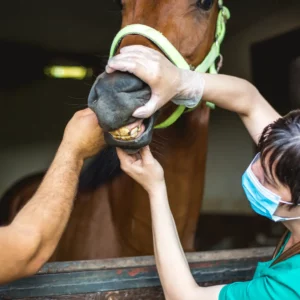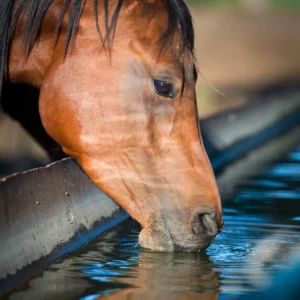Blog
Common Horse Health Issues
Caring for horses is a rewarding experience that comes with its set of challenges, especially when it comes to maintaining their health. Like any other pets, are prone to a variety of horse health issues. Understanding these common conditions, recognizing their symptoms, providing initial care, and knowing when to consult a veterinarian are crucial aspects of responsible horse ownership. This comprehensive guide will delve into common horse health issues, offering insights on detection, remedies, and the importance of professional veterinary care.
6 Most Common Horse Health Issues
1. Colic: The Abdominal Menace
How to Know: Colic in horses refers to abdominal pain that can arise from a variety of gastrointestinal issues. Signs include pawing at the ground, rolling, looking at their flank, lack of appetite, and lack of bowel movements. Colic is one of the most diagnosed horse health conditions.
How to Fix: Immediate measures include walking the horse gently to encourage bowel movement and removing feed while monitoring symptoms. However, colic often requires veterinary attention to determine the cause and appropriate treatment, which can range from medication to, in severe cases, surgery.
When to See a Vet: Colic can rapidly progress from mild discomfort to a life-threatening emergency. If symptoms persist or worsen, call your veterinarian immediately.
2. Laminitis: A Threat to Hooves
How to Know: Laminitis is inflammation of the laminae within the hoof, leading to severe pain and potential hoof deformation. Symptoms include lameness, especially when turning, heat in the hooves, and a noticeable pulse in the foot.
How to Fix: Initial care involves removing the cause, if known (such as excessive grain intake), providing soft bedding, and limiting movement to prevent further damage and help horse health.
When to See a Vet: Laminitis requires urgent veterinary intervention to alleviate pain, address inflammation, and implement strategies to prevent further damage or recurrence.
3. Respiratory Infections
How to Know: Horses with respiratory issues may exhibit coughing, nasal discharge, increased breathing effort, and reduced performance. Environmental factors, such as dusty bedding or poor ventilation, often exacerbate these conditions.
How to Fix: Improve the stable environment by ensuring clean, dust-free bedding and adequate ventilation. Rest is crucial for recovery.
When to See a Vet: Persistent symptoms, fever, or difficulty breathing warrant immediate veterinary attention to rule out serious infections like equine influenza or strangles.
4. Skin Conditions
How to Know: Skin issues in horses can manifest as hair loss, itching, scaling, or the presence of sores. Causes range from parasitic infestations to fungal infections.
How to Fix: Basic care includes thorough grooming, cleaning affected areas with antifungal or antibacterial washes, and removing environmental triggers.
When to See a Vet: If the condition persists or if the horse seems in discomfort, consult your vet for a diagnosis and targeted treatment plan.
5. Equine Metabolic Syndrome (EMS)
How to Know: EMS is a metabolic disorder characterized by insulin resistance, obesity, and an increased risk of laminitis. Signs include abnormal fat deposits, increased thirst and urination, and recurrent laminitis.
How to Fix: Management focuses on weight control through diet adjustments and regular exercise. Reducing sugar and starch intake is key.
When to See a Vet: A veterinarian can provide a diagnosis through blood tests and recommend a comprehensive management plan to control symptoms and reduce the risk of laminitis.
6. Dental Problems
How to Know: Signs of dental issues in horses include difficulty chewing, dropping feed from the mouth, bad breath, and head tossing while eating.
How to Fix: Regular dental check-ups and care by a qualified equine dentist or veterinarian can prevent many dental problems.
When to See a Vet: Any sign of dental discomfort warrants an examination by a professional to address sharp points, uneven wear, or other dental abnormalities.
Conclusion
Recognizing the early signs of these common horse health issues is vital for timely intervention and treatment. While some conditions can be managed with initial care and adjustments, the importance of veterinary expertise for maintaining horse health cannot be overstated. Regular check-ups, proper stable management, a balanced diet, and prompt attention to any signs of discomfort can go a long way in ensuring horse health and well-being. Remember, when in doubt, always opt to consult your veterinarian to safeguard the health of your equine companion.



